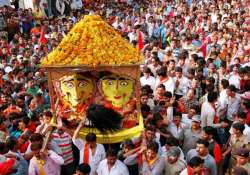Know about Himalayan Kumbh that is held every 12 years
New Delhi: Himalayan Kumbh, also known as Nandadevi Raj Jat yatra, which is held every 12 years, began amid religious customs and traditions from Nauti village in Chamoli district.It has a legend, the procession accompanies

New Delhi: Himalayan Kumbh, also known as Nandadevi Raj Jat yatra, which is held every 12 years, began amid religious customs and traditions from Nauti village in Chamoli district.
It has a legend, the procession accompanies Nanda Devi, the consort of Lord Shiva as she leaves her village for Nanda devi parbat to be with the lord.
The Himalayan Kumbh or the Nanda Devi Raj Jat's significance can be traced back from the 15th century. Himalayan Kumbh is considered among the toughest pilgrimages in India.
It couldn't be held in 2012 because Bhadrapad coincided with 'Mal Mass' - the extra month added to the Hindu lunar calendar (which has approx. 354 days) every 30 months to synchronize it with the solar calendar. This period is considered inauspicious by Hindus, which is why the yatra was scrapped in 2012.
In 2013, the pilgrimage was called off on account of the massive floods in the state.
A four-horned sheep that symbolizes Nanda Devi leads approximately 280-km yatra.
The sheep is one of the main attractions of the yatra and enjoys a strong security cover all along the journey till Homkund, where it is left behind with wild with ornaments, food and clothings after the havan.
Raj Jat pilgrims have stopovers at 18 halts along the trek, all of which are located at altitudes between 1,200 and 4,000 m above sea level.
In Himalayan Kumbh, devotees wear colourful attires in Nauti village in Chamoli district, as the ceremonious start with procession of pilgrims.
The pilgrimage is conducted on a tight 19-day schedule at the end of which pilgrims return to the starting point.